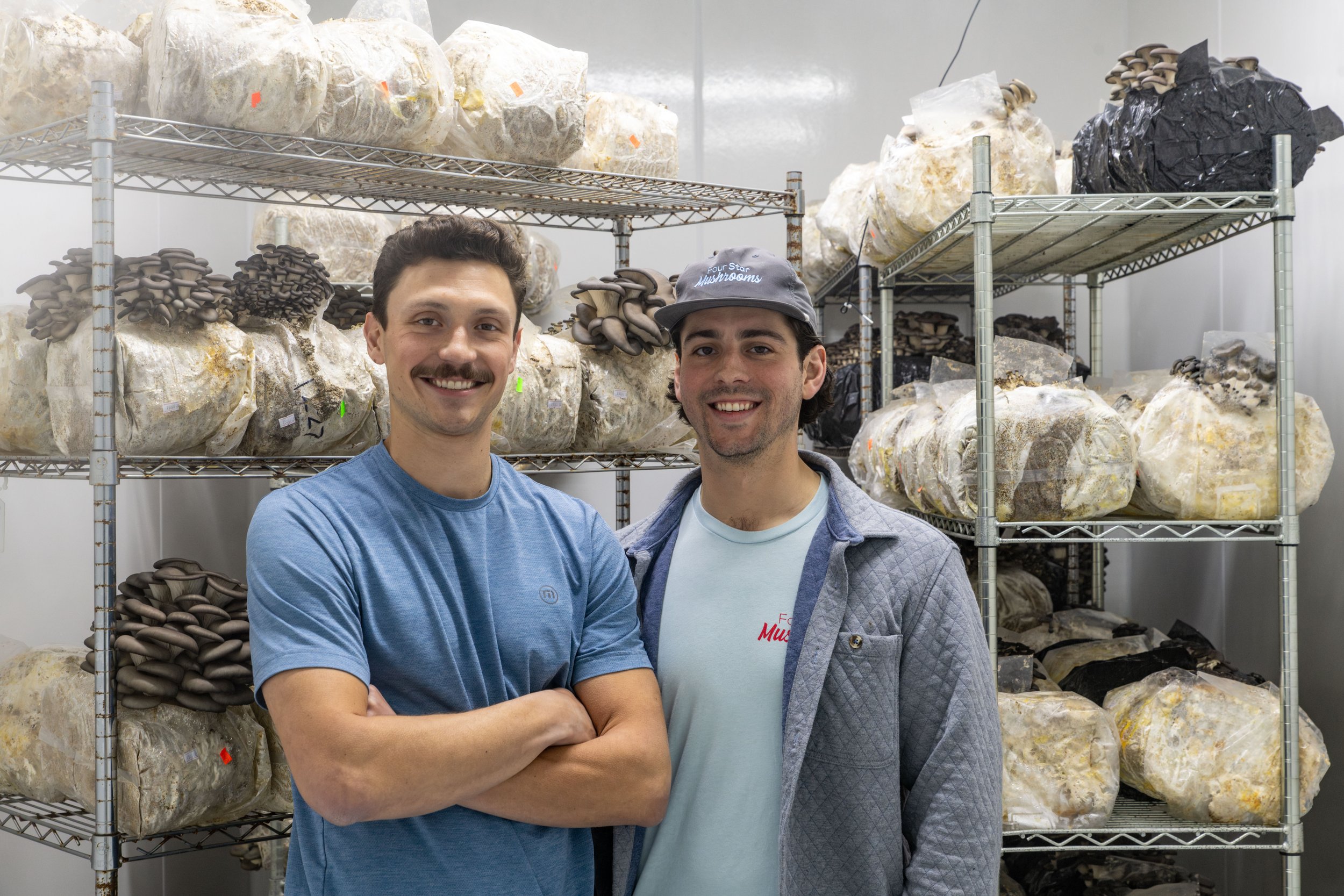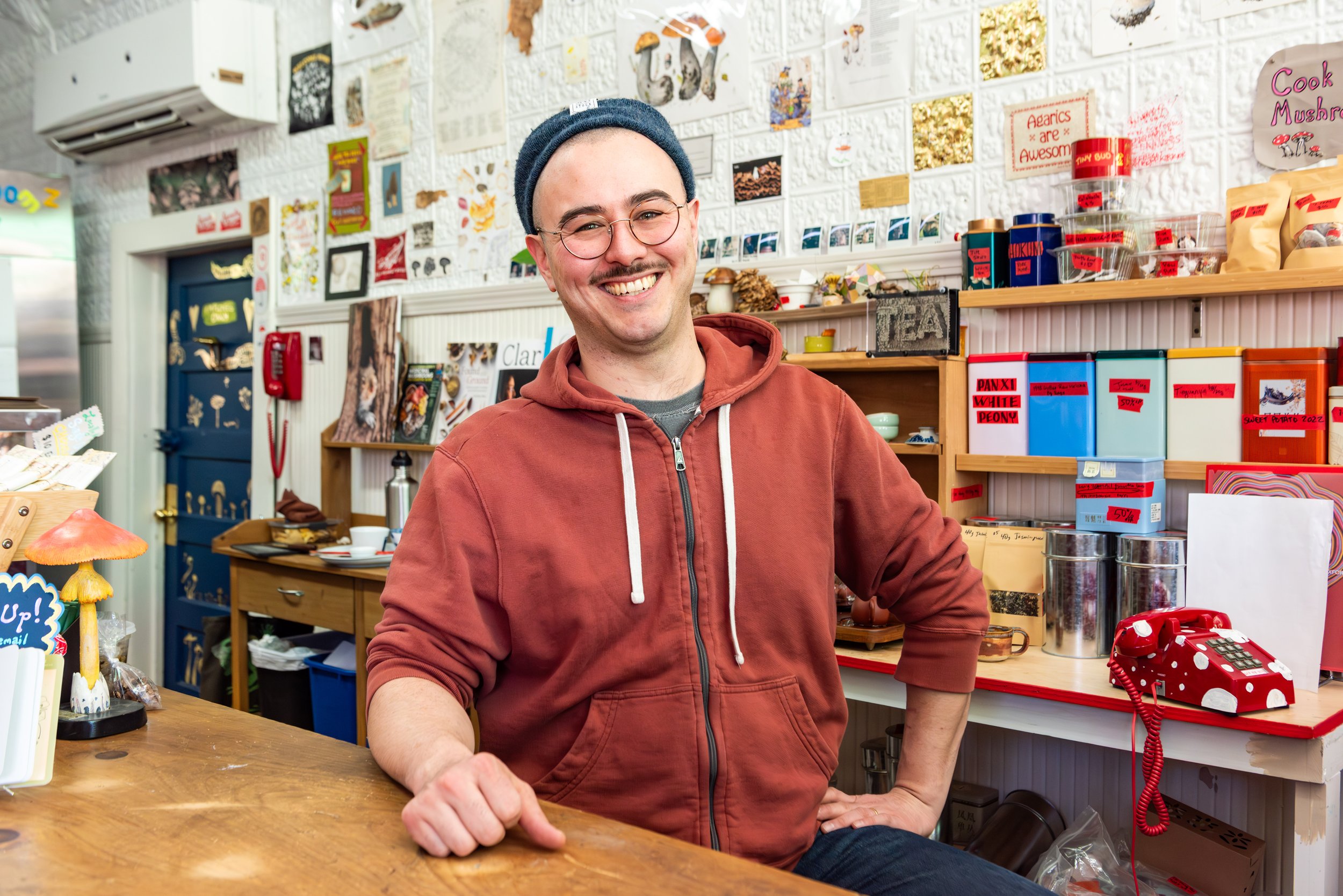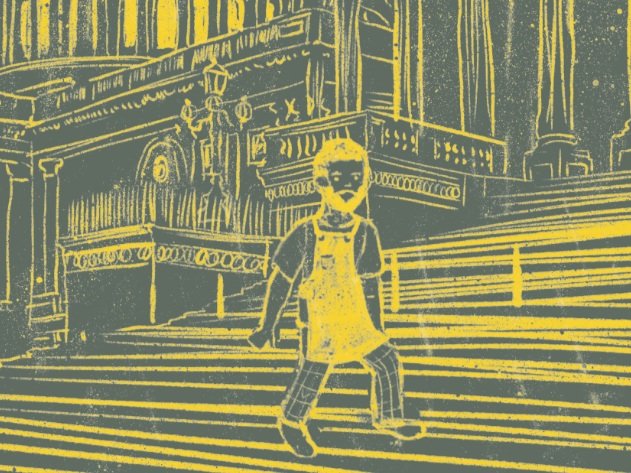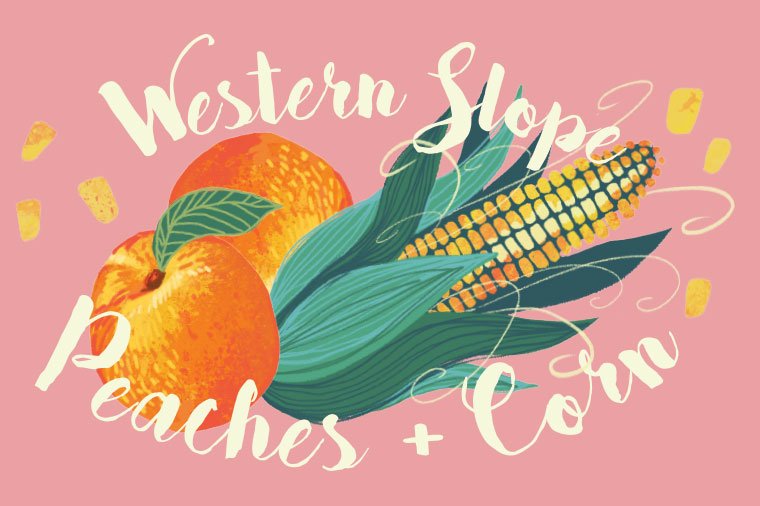The Future is Fungi
Four Star Mushrooms seeks a sustainable food system through regenerative agriculture.
photos: alexander zeren
In 2019, friends Joe Weber and Sean DiGioia founded Four Star Mushrooms in Chicago to help save the planet, one mushroom at a time. Weber, a graduate from the University of Illinois with a degree in biology who worked in the renewable energy space, and DiGioia, a former finance professional, were driven by a desire to create a more sustainable, regenerative food system.
“When I started the company after graduating college, it was spurred by this fact that monocrop agriculture was not only decimating our ecosystems, but also leading to bad health outcomes for people through processed foods,” Weber says. “Monoculture, coupled with the pesticides and herbicides it requires, are literally poisoning our bodies and contributing to soil erosion. Sean and I had a similar viewpoint on the food system, how we think it needs to change, and how mushrooms can be a part of that.”
“We’re taking organic byproducts from the agriculture and timber industries and turning that into food that grows our mushrooms, creating a highly nutritious, protein-rich, sustainable, and delicious product. That checks all the boxes in terms of where we’d like to see the food system headed.”
Here’s how mushroom cultivation works at Four Star Mushrooms: Weber and DiGioia source (or upcycle) organic waste like soybean hulls and red oak sawdust that would otherwise be sent to landfills. The waste is processed, hydrated with water, pasteurized, and then inoculated with the fungi. Once the mushrooms have fully colonized the material, they’re transferred to a room with more humidity and air control. Depending on the variety, the mushrooms take seven to 24 days to fully grow.
Four Star Mushrooms’ product range includes seven main varieties: lion’s mane, chestnut, black oyster, blue oyster, king trumpet, golden enoki, and maitake, which are available in fresh and dried forms.
Four Star Mushrooms’ team of three full-time staff members—in addition to the co-founders— work together to produce, harvest, package, and distribute the mushrooms in a climate-controlled, 11,000-square-foot warehouse in the heart of the Fulton Market District. The mushrooms can be cultivated year-round indoors, with minimal water and other resources needed. The company has grown from its humble beginnings in a roughly 400-square-foot space in Logan Square. Weber says the team produces and distributes about 2,000 pounds (literally, a ton) of mushrooms a week, with the potential to produce up to 10,000—”we hope to max out the facility in the next 18 months.”
“When you’re upcycling at this level, it’s important to use a standardized product,” Weber says. “We work with a mill in Missouri that sources the material and turns it into a shelf-stable pellet we can then hydrate and pasteurize to make them ready for inoculation.”
Even the spent mushroom food and remnants from the harvesting process can be used as a nutrient-dense soil amendment, which Four Star Mushroom donates to local producers. “This is why mushrooms are such a sustainable product; they close the loop on our agriculture processes and create a model for a carbon negative, zero-waste, vertically integrated food system.”
Regenerative agriculture is becoming a common phrase these days as more farmers, ranchers, and producers like DiGioia and Weber focus on improving the health and nutritional value of the food we eat. They’re also working with chefs to drum up more excitement about these nutritious, sustainable products and hope they can educate the general public about their importance.
Locally, DiGioia and Weber work with about 200 (and counting) chefs, restaurateurs, and caterers who showcase their mushrooms on menus and for special events. They also have a retail arm, supplying their mushrooms to Jewel-Osco, Mariano’s, and other grocery stores across Chicagoland. They are planning to open a retail shop out of their warehouse in Fulton Market in the fall.
“We started organically; literally knocking on doors at restaurants, bringing samples, and talking about the reason we started the company,” Weber says. “Chefs really started to gravitate to our sustainability story, and they liked the hyper-local aspect of the product. We’ve worked with restaurants like Alinea that not only have a great reputation, but also a pretty high throughput of chefs.”
DiGioia says the duo continues to grow their network through word of mouth and regular emails announcing product availability. Plus, the physical proximity to restaurants in Fulton Market and the West Loop doesn’t hurt. They often conduct educational sessions at nearby restaurants, including Roister, most recently.
“We’re able to sit down with both front and back of house and explain who we are, what our process is, and how that can be translated to customers,” DiGioia says. “We’re all about transparency—that’s why we even have our entire production area behind glass, so chefs can bring in their entire staff and see first hand and learn about our product.
Chef-Owner Zachary Engel of Galit first met Weber when he showed up at his restaurant door one day. “I learned more about the product and was really on board,” Engel says. “I believe in the Four Star Mushrooms mission.” Engel has used Four Star’s lion’s mane as the ‘protein’ for his vegan avgolemono, or Greek lemon soup.
Charles Wong, chef-owner of Umamicue, sources Four Star Mushrooms’ lion’s mane for faux chicken nuggets as a vegan option on the menu. “They have a nice, meaty texture and absorb other flavors really well,” says Wong “For the dipping sauce, we’ll take Four Star Mushrooms’ bruised mushrooms and other ‘ugly produce’ that [grocers] don’t want to sell and make duxelles that we then blend to make a paste and fold into vegan mayo. I really admire what [Sean and Joe] are doing with their product, and I think they’re solving a real problem by offering a premium product, and even donating the spent substrates to rebuild our soil.”
Jennifer Kim, chef de cuisine at Proxi, uses Four Star Mushrooms in a few dishes. “We most recently used it as a compound butter to fortify a hand-rolled rice cake dish that also featured [Four Star’s] chestnut mushrooms, both fresh and preserved as a sott’olio.”
“We find that chefs are willing to pay a premium for a product that is premium in quality and consistency,” says DiGioia. “Chefs are able to translate the quality all the way to the end consumer, as well as share our mission of building a sustainable food system. The support of our mission and product from chefs is what has allowed us to grow.”
“That’s the thing about regenerative agriculture—it increases the nutrient density of our food by building soil health and making our ecosystems more resilient,” he says. “I was talking to a farmer the other day and he introduced me to the Brix score, where if you compare his lettuce to conventionally-grown lettuce, you would need to grow 77 leaves of conventional lettuce to compare to one of his, nutritionally.”
DiGioia and Weber are excited about the future growth and possibilities of their fungi. Aside from gearing up to open their retail shop, they’re working on streamlining and automating the production process by investing in additional processing equipment, with the added goal of reconfiguring their production to become a net zero company.
“We think that our upcycled byproduct, and mycelium and mushrooms in general, are going to be a critical component to scaling up our source of regenerative food in this country,” Weber says. “We’re hoping to continue to be a part of that movement.”






